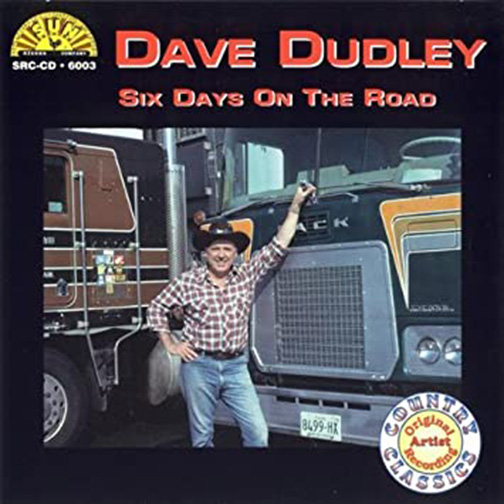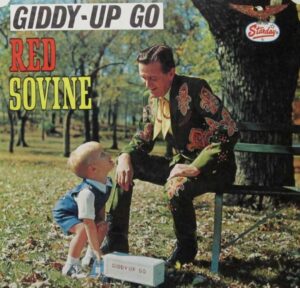Dave Dudley released seven singles for country radio between 1955 and 1962, but as he told Vic Willis of The Willis Brothers on television one night in 1963, “None of them were very good.”
Dudley made up for any early career failures that evening when he debuted his signature song “Six Days on the Road,” a cut from his first album, “Dave Dudley Sings ‘Six Days on the Road.’”
The song not only started Dudley on a career focused on the working man and truck-driving songs, but it also landed him the No. 2 position on the Billboard Country Charts and No. 32 on the Billboard US Chart.
Likewise, Dudley offered inspiration to performers like Merle Haggard, who later made a career of singing tales of the all-American, masculine, working man — a man proud of his country and not fearful of expressing his love for America, family and God.
David Darwin Pedruska, alias “Dave Dudley,” was born in Spencer, Washington, in 1928. His grandparents, immigrants from Germany, gave him a guitar when he was 11, and Dudley taught himself to play.
After an unsuccessful career as a baseball player, Dudley chose his second favorite subject — country music — as a profession.
He released several singles during the first seven years of his career, two of which charted. “Under the Cover of the Night” was his biggest early hit, rising to No. 18 on the charts. The song also showed enough promise to land Dudley a recording contract with Golden Vee Records.
Dudley’s new label wasted little time producing “Six Days on the Road” as a single. That No. 2 hit gave way to a slew of remakes over the next six decades; in fact, covers of “Six Days” continue to be made today.
But Dudley wasn’t a one-hit wonder. Over the course of his career, he had 33 Top 40 Country hits, including trucker anthems like “Trucker’s Prayer,” “Truck Drivin’ Son of a Gun” and “There Ain’t No Easy Run.”
Among the most popular and well-known trucking songs in history (in fact, several online ratings sites list it as the best-ever trucking song), “Six Days on the Road” uses Dudley’s barreled vocals to make listeners feel like they’re riding shotgun to Dudley himself.
It wasn’t that the song had any unique quality; it just helps set another two decades of trucking songs that have accompanied drivers along the road. Still, “Six Days” does its best to summarize a truck driver’s life, if only during the era it debuted.
Dudley uses the lyrics of “Six Days” to immediately set the stage for the remainder of the song. When he sings, “I pulled out of Pittsburgh rollin’ down that Eastern Seaboard,” the listener knows the driver is headed south, and he’s doing so with a vengeance. His diesel is “wound up” and is running “like never before,” and the driver isn’t going to let any speed traps stop him on his way home.
Adding realism to the song and showing that he knew about the topic he was describing, Dudley throws in words about his “10 forward gears,” “a Georgia overdrive” and the names of other trucks — “Jimmy” (GMC) and White. And he again reminds everyone that he not slowing down as he passes “everything in sight.”
The driver notes that there’s only one woman in is life, and he’s planning to see her by nightfall:
Well it seems like a month since I kissed my baby goodbye
I could have a lot of women but I’m not alike some other guys
I could find one to hold me tight
But I could never make believe it’s all right
Six days on the road and I’m gonna make it home tonight.
Reality comes back into the picture when Dudley lets the listener know that the Interstate Commerce Commission (“ICC”) is conducting inspections down the road.
Despite his load being over the weight limit and his log book overdue for an entry — issues that have been automated today — Dudley avoids the problem by dodging the weigh stations that once dotted the interstate landscape.
Of course, modern automation wouldn’t allow him to “dodge” much of anything in the 21st century. But “Six Days” is a song of the 1960s, and it addresses issues of the era.
Once Dudley establishes that he’s rolling home with no plans to get delayed, he lets the listener know that his truck may not be all he claimed when he left Pittsburgh.
It’s “a little old but that don’t mean she’s slow,” he informs listeners, adding “there’s a flame from her stack and that smokes been a blowing black as coal” (remember, the environmental movement was still nearly a decade away).
Regardless, the truck has served the driver well, and by song’s end, he is heading into his hometown, one happy driver — and ready to see his “baby.”
In general, “Six Days” is an upbeat and positive tune, but if one reads between the lyrics, the problems that plague truck drivers and the profession ring true.
The driver is a lonely man far from home and for too long. He gets his share of ladies making passes at him at truck stops along his route, and he consistently gives them the cold shoulder because the person he loves is at the end of the rainbow — his latest week-long route.
Keeping to a schedule and staying legal would be concerns if he weren’t so obsessed with getting home. And to throw in another statement of the era, the song addresses one issue of the truck driving profession that resonates today.
In just the second verse of the song, the driver admits to taking “little white pills” that keep him awake. (Of course, we are all well aware some 60 years later that “awake,” “attentive” and “safe” are not necessarily comparable terms.) Those “uppers” aren’t the norm among drivers today — after all, random drug screening makes those white pills more difficult to get away with.
In later years, Dudley’s reference came under the scrutiny of people with agendas other than making music. Perhaps the combination of caffeine and energy supplements could serve as a substitute and make the lyrics more accurately apply to the industry today.
Actually, in recent covers of “Six Days on the Road,” the little white pills are gone.
Instead, the driver sings of passing “little white lines.” To the discerning listener, the change in lyrics to fit the times should not go unnoticed.
Johnny Cash’s famous refusal to change one word in Kris Kristofferson’s line, “Lord, I wish I was stoned” in his live national television performance of “Sunday Morning Coming Down” in the late ’60s set a high bar against bending to executives’ opinions of society’s wants.
In the case of “Six Days,” the change in lyrics reflects a loss of continuity and meaning in Dave Dudley’s wildly popular song. It’s unlikely he would approve of the change in his signature song today.
Until next time, keep your eyes on those little white lines and don’t swerve too far off your trail.
After all, whether it’s today or next week, chances are that, like Dave Dudley, you’ll soon to be planning to “make it home tonight.”
Since retiring from a career as an outdoor recreation professional from the State of Arkansas, Kris Rutherford has worked as a freelance writer and, with his wife, owns and publishes a small Northeast Texas newspaper, The Roxton Progress. Kris has worked as a ghostwriter and editor and has authored seven books of his own. He became interested in the trucking industry as a child in the 1970s when his family traveled the interstates twice a year between their home in Maine and their native Texas. He has been a classic country music enthusiast since the age of nine when he developed a special interest in trucking songs.









